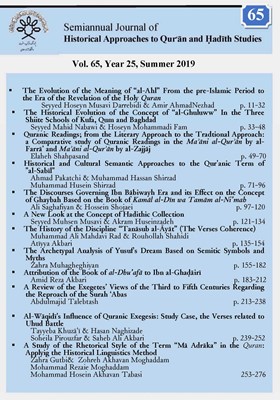A Study of the Rhetorical Style of the Term “Mā Adrāka” in the Quran Applyig the Historical Linguistics Method
Subject Areas : -
zahra Gotbi
1
,
Zohreh Akhavan Moghaddam
2
,
Mohammad Rezaie Moghaddam
3
,
Mohammad Hosein Akhavan Tabaci
4
![]()
1 - Assistant Prfessor In Quranic Studies, University of Quranic Sciences, Tehran, Iran.
2 - Associated professor In Quranic Studies, University of Quranic Sciences, Tehran, Iran.
3 - M.A. in Quran and Hadith Studies, Imam Sadiq University, Tehran, Iran.
4 - PH. D. student in Quran and Hadith Studies, Tarbiat Modarres University, Tehran. Iran.
Keywords: Etymology, The Style of “Mā AdrāK”, Literary Structure, the Verb “Darā”,
Abstract :
One of the literary styles of the Qur'an among the religious texts is the usage of the term "Ma Adrāk". Given its old history, it highlights the importance of rereading the meaning of this expressive style in light of the differences of commentators in its literary structure. One way to get rid of interpretative differences about the concepts of Qur'anic terms is to use historical semantic. In this paper, we use semantic analysis of the term "Darā" and its derivatives to arrive at a detailed analysis of the literary structure of "Ma Adrāk" by using historical linguistic methods such as etymology and Semitic language studies. The result shows that the meaning of "knowing" in this "verb" is much older than the root of "Alima" in the Arabic language. This plays a key role in resolving the differences between the literary experts and commentators on the literary analysis of the derivative of "Dari" and its derivatives in the Qur'an, especially in the "Ma Adrāk". In explaining this verb, the litterateurs and commentators have compared it with the verb "Alime" (to know), while they have two different literary structures. This Qur'anic style discusses the resurrection and its circumstances and divine destinies, and its expressive function in terms of the result of the material ontology of the "Dara" paying attention to the root of the verb includes concepts such as "Tahwīl" "Tafkhīm" and "Ta’ḍīm".
_||_


